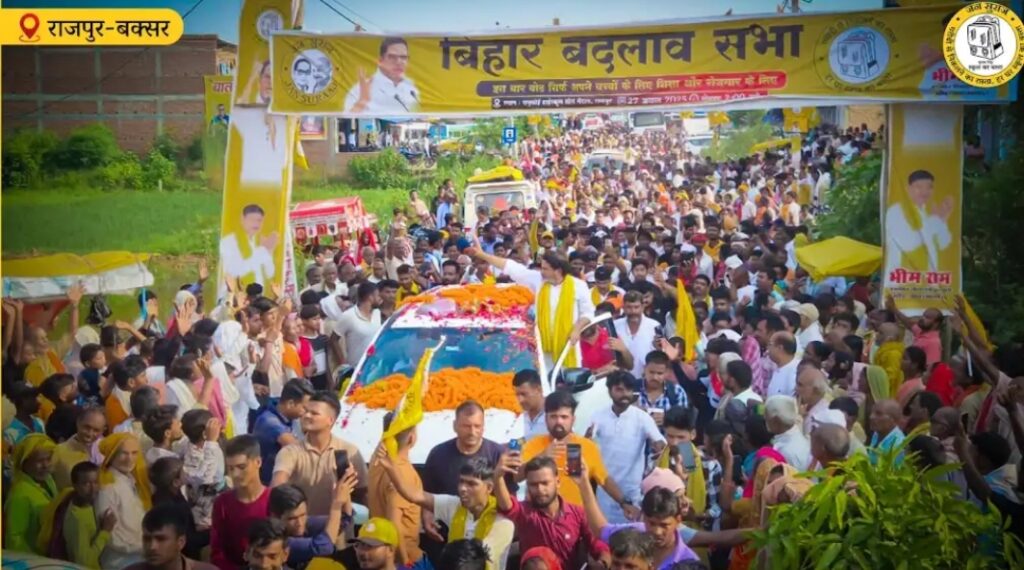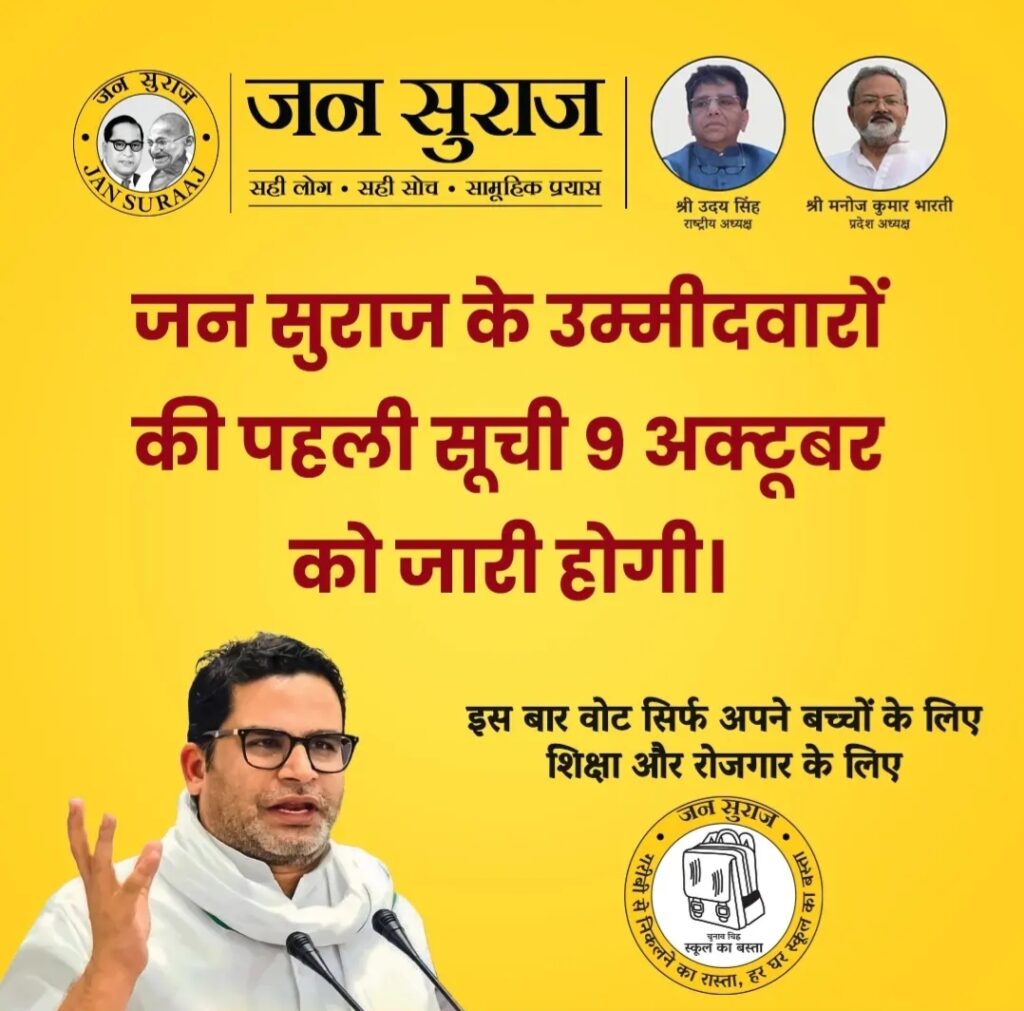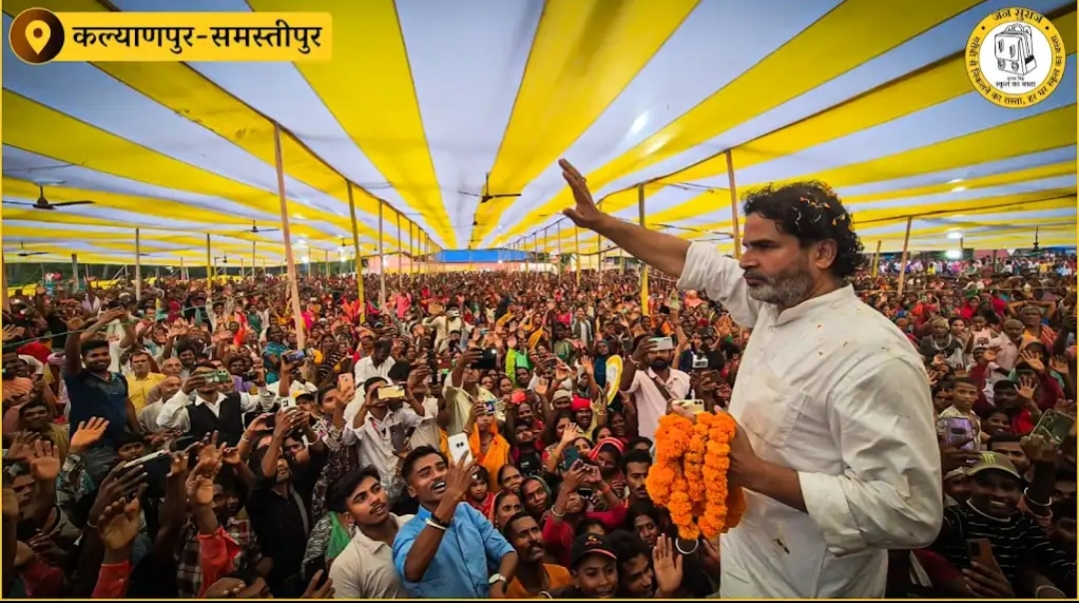In the heartland of India, where politics often revolves around entrenched dynasties, caste equations, and short-term populism, a new force is emerging. Prashant Kishor, the acclaimed political strategist–turned–reformer, launched the Jan Suraaj Party, aiming to redefine governance in Bihar.
On October 2, 2024—coinciding with Gandhi Jayanti—Kishor formally unveiled his party, invoking the spirit of Mahatma Gandhi in a state that once served as the cradle of India’s independence movement. This launch was not just a political event; it was a bold declaration of intent to infuse morality, transparency, and long-term vision into Bihar’s fractured political landscape.
Kishor’s journey from behind-the-scenes election wizard to frontline leader captures the imagination.
His Jan Suraaj movement, now formalized as a party, promises a Bihar free from the shackles of corruption, inequality, and underdevelopment. At a time when the state grapples with stereotypes of backwardness, Kishor stands as a beacon of hope, blending intellectual rigor with unyielding determination. His approach challenges the status quo, prioritizing inclusivity and planning over divisive tactics.
From Election Strategist to Bihar’s Visionary
Prashant Kishor’s rise to prominence began far from the dusty roads of Bihar.
Born in the state, he initially carved out a reputation as one of India’s most effective political consultants. Kishor masterminded landmark election victories, including Narendra Modi’s 2014 campaign and Nitish Kumar’s successes in Bihar. His strategies revolutionized Indian politics, emphasizing data-driven decisions, targeted messaging, and grassroots mobilization. Yet, unlike many who chase power through proxies, Kishor chose a different path. Disillusioned with the system’s flaws, he turned his focus homeward, vowing to address Bihar’s chronic issues directly.
What distinguishes Kishor is his rare combination of intellect and conviction. He rejects the politics of caste and corruption that have long plagued Bihar, advocating instead for a merit-based, transparent system. His vision for Jan Suraaj is rooted in creating opportunities for all, ensuring development reaches the remotest villages. Kishore envisions a Bihar that stands shoulder-to-shoulder with India’s most prosperous states—a land of dignity, prosperity, and pride.
This shift wasn’t impulsive. For over two years, Kishor has traversed Bihar on foot through the Jan Suraaj Yatra, covering thousands of kilometers. This isn’t a typical election rally filled with blaring microphones and fleeting promises. It’s a deliberate, patient engagement with ordinary people—farmers, laborers, students, and homemakers—in villages, towns, and hamlets. By listening to their grievances and aspirations, Kishore has built a movement from the ground up, echoing the grassroots ethos that defined India’s freedom struggle.
Embracing Gandhian Ideals in a Modern Context
The choice of Gandhi Jayanti for Jan Suraaj’s launch was laden with symbolism. Bihar, where Gandhi launched his first Satyagraha in Champaran in 1917, is once again positioning itself as a laboratory for democratic renewal. Kishore’s initiative draws directly from Gandhian principles: truth, non-violence, and service to the last person in society. In an age dominated by social media spectacles and divisive rhetoric, Kishore’s insistence on face-to-face dialogue and moral integrity feels revolutionary.
Gandhi once declared that politics without morality is a sin. Kishor embodies this by stressing decentralization, honesty in public life, and antyodaya—the upliftment of the most marginalized. Jan Suraaj’s platform avoids easy vote-bank politics, focusing instead on sustainable reforms. Kishor calls for empowering local governance, rooting out corruption, and fostering inclusive growth. His Yatra has sparked debates on whether politics can reclaim its moral compass, forcing even critics to acknowledge the need for change.
Kishore’s humility adds depth to his leadership. When questioned about the timing of his political plunge, he invokes niyati—destiny—and divine will. “Why now?” he reflects, acknowledging that despite sincere efforts, outcomes may not always align with human plans. This blend of perseverance and faith sets him apart in a field often marred by arrogance. Kishore views his role as one of steadfast effort, leaving results to a higher power. It’s a refreshing departure from the self-aggrandizing narratives prevalent in Indian politics.
Challenges in Transforming Bihar’s Political Culture
Bihar’s political terrain is notoriously tough. Decades of governance failures have left the state with high poverty rates, inadequate infrastructure, and migration crises. Entrenched players, including long-standing parties like the RJD and JD(U), rely on caste alliances and patronage networks. Kishor’s refusal to engage in such formulas is both his strength and vulnerability. Supporters hail it as a return to principled politics; detractors deem it naive.
The Jan Suraaj Yatra has already made waves, drawing crowds and generating buzz. Kishor’s interactions reveal a deep connection to Bihar’s soul—its resilient people yearning for change. He speaks of building a just society where every citizen has access to education, healthcare, and employment. His plans include decentralizing power to panchayats, promoting ethical governance, and investing in long-term development projects. By prioritizing these, Kishore aims to break the cycle of short-termism that has hindered Bihar’s progress.
Yet, success is far from guaranteed. Political analysts question whether a movement built on ideals can withstand the rigours of electoral battles. Bihar’s voters, while aspirational, often prioritize immediate benefits over abstract reforms. Kishor’s challenge is to translate his vision into tangible wins, perhaps in the upcoming assembly elections. His track record as a strategist gives him an edge—he knows how to mobilize voters—but leading from the front demands a different skill set.
Critics argue that Kishore’s approach, while admirable, may be too slow in a fast-paced political arena. The Yatra’s emphasis on dialogue over drama contrasts sharply with rivals’ high-decibel campaigns. However, this “stubborn insistence,” as Kishor calls it, has already shifted the discourse. Parties are now compelled to address issues like transparency and decentralization, even if superficially.
A Leader Born Once in a Century
Prashant Kishore is more than a politician; he is a catalyst for change. In a nation where leaders often prioritize personal ambition, Kishore places public good above all. His journey reflects a profound commitment to Bihar, driven by a sense of duty rather than destiny alone. By invoking Gandhi, he reminds India that true leadership lies in service, not spectacle.
Whether Jan Suraaj transforms Bihar remains to be seen. The path ahead is fraught with obstacles, from financial constraints to opposition’s smear campaigns. But Kishor’s movement has already achieved a moral victory: reigniting faith in politics as a force for good. In Bihar, where hope has often been deferred, Kishore offers a blueprint for renewal—one step, one conversation at a time.
As India watches, Bihar may yet emerge as a model of moral politics. Prashant Kishor, with his blend of vision, humility, and courage, could well be the leader who ushers in this era. For a state long awaiting its renaissance, Jan Suraaj represents not just a party, but a promise of a brighter tomorrow.
(Writer is Dubai–based Engineer and native of Bihar ; Views are personal)


All pic credit social media





